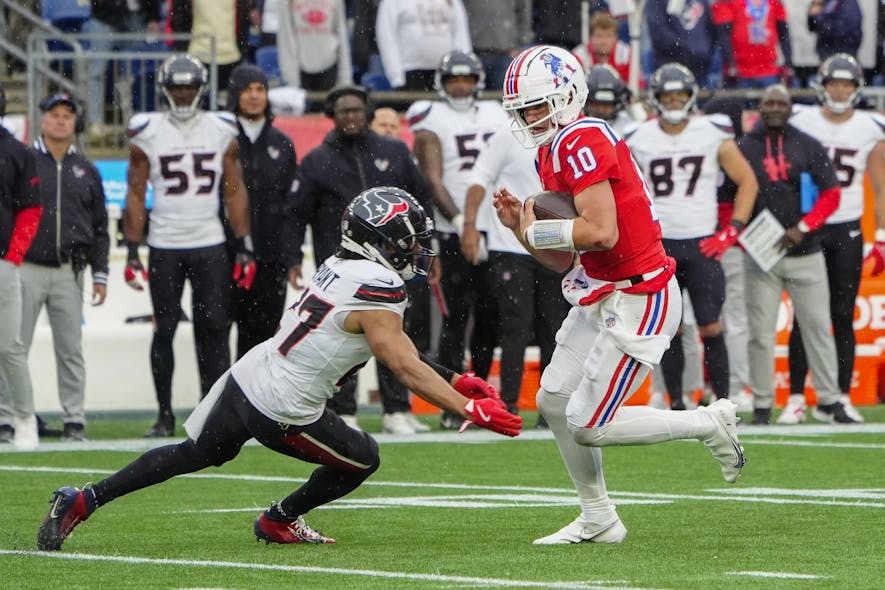Go here for this week's Rushing Matchups.
Top 5 Passing Matchup
Tampa Bay vs Baltimore
Baker Mayfield is experiencing a true resurgence in Tampa Bay this season, delivering career-best numbers in completion percentage, yardage, and touchdown rates through six games. His latest performance was especially impressive: completing 24 of 36 passes for 325 yards and 4 touchdowns in a 51-point blowout win against the Saints. Notably, this came against a quality pass defense, making his success even more significant. However, Mayfield still has his share of flaws. Even in that breakout game, he threw three mid-game interceptions that could have changed the outcome, highlighting his inconsistency at times. Much of Mayfield's success can be attributed to Tampa Bay's strong receiving corps. While Mike Evans' status is uncertain due to a limp he sustained during the Saints game, Chris Godwin has stepped up as the team's most consistent playmaker. Godwin caught 11 of 13 targets last week, including two touchdowns, and has been a reliable force for Mayfield throughout the season. Even on his “worst” day this year, Godwin managed five receptions for 64 yards against a tough Falcons defense. If Evans is limited or sidelined, rookie Jalen McMillan or tight end Cade Otton may have opportunities to shine.
The Ravens' pass defense, while effective in preventing touchdowns, has allowed over 269 passing yards in five of their six games this season. Their pass rush is underperforming, ranking 24th in both hurry and blitz rates, which has increased pressure on their secondary. Although Marlon Humphrey and Brandon Stephens are solid in coverage, the secondary overall is vulnerable to blown coverages and missed tackles. This was particularly evident in their recent game against the Bengals, where Ja'Marr Chase and Tee Higgins both had standout performances. Last week, Washington's Terry McLaurin also won key one-on-one battles, scoring two red-zone touchdowns. The Ravens' inability to consistently defend deep passes makes this a favorable fantasy matchup for Mayfield and the Buccaneers' passing game, particularly if Godwin remains involved and Evans is able to suit up. Until the Ravens show they can tighten up their downfield defense, opposing quarterbacks and wide receivers should continue to find success against them.
Baltimore at Tampa Bay
Lamar Jackson has been putting on a show in the Ravens' passing game, proving doubters wrong by throwing for over 300 yards in back-to-back weeks and tallying five touchdowns in the process. His only interception in that span came off a dropped pass by tight end Mark Andrews. The Ravens' offense is now fully embracing Jackson's strengths, blending play-action and his natural playmaking ability to keep defenses on edge. Last week against Washington, Jackson spread the wealth among his receivers. Zay Flowers emerged as his top target, catching 9 passes for 132 yards, while Rashod Bateman chipped in with 71 yards on 4 receptions. Even Andrews, who had been relatively quiet, came alive with 66 yards on 3 catches. This high-functioning air attack now faces another favorable matchup against the Buccaneers, a defense that has struggled recently against top-tier wideouts.
Tampa Bay's pass defense may appear solid in the rankings, but that could be deceiving. In Week 5, they were exposed by Kirk Cousins, who threw for 509 yards and 4 touchdowns, raising major concerns. Although they were able to rebound somewhat last week, it was against a Saints team led by a fifth-round rookie quarterback and missing top receiver Chris Olave for much of the game. Todd Bowles' aggressive, blitz-heavy defense can create havoc, but it also leaves the secondary vulnerable, particularly in coverage. Jamel Dean, their top cornerback, left last week's game with a hamstring injury, potentially weakening the unit even further. If the Buccaneers can't get to him consistently, it's hard to imagine their secondary, which may rely on inexperienced players like Tyrek Funderburk, Dallis Flowers, and Keenan Isaac, being able to contain the Ravens' high-powered passing game. This sets up another promising outing for Jackson and his primary weapons, particularly Flowers and Andrews, who could thrive against this defense.
New England at Jacksonville
Drake Maye offers a much-needed spark for the Patriots after Jacoby Brissett's five uninspiring starts. Brissett managed just two touchdowns during that stretch, never surpassing 170 passing yards, leaving the offense stagnant. In contrast, Maye's first start showcased his dynamic potential, as he completed 61% of his passes for three touchdowns. This newfound willingness to test defenses downfield immediately stood out, particularly on a well-placed throw to Kayshon Boutte along the deep right boundary. Maye's chemistry with Boutte and slot receiver Demario Douglas was a clear highlight, with Douglas hauling in 7 receptions for 92 yards and a score. Tight end Hunter Henry also contributed with a short touchdown, rounding out what could be a more balanced attack moving forward. While this Patriots offense might not be explosive just yet, Maye's ability to stretch the field gives them a much-needed boost heading into the back half of the season. This week's matchup could offer the best opportunity for the Patriots to capitalize on Maye's strengths over the next couple of months.
The Jacksonville Jaguars' pass defense has struggled mightily, hitting a low point in London, where they allowed Chicago's Caleb Williams to complete 79% of his throws for four touchdowns. On the season, Jacksonville has allowed 330+ passing yards in half of their games and has been repeatedly gashed by top wideouts like Tyreek Hill, Jaylen Waddle, and Nico Collins. Deep threats and underneath weapons alike have found success, and opposing quarterbacks have thrown four touchdowns in two separate games this season. The Jaguars' defensive woes can be attributed to a lack of pass rush and weak coverage, particularly from replacement-level players like Montaric Brown and Antonio Johnson. While top cornerback Tyson Campbell's return could help, Jacksonville's secondary remains a major vulnerability. This matchup with the Patriots provides Maye with a prime opportunity to continue his development and attack a unit that has struggled against both deep and short passing plays.

